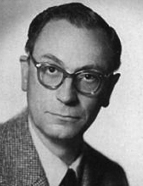

He was later appointed director of the Institut Français d’Amérique Latine [French Institute in Latin America] in Mexico and cultural and technical co-operation attaché of the French Embassy, also in Mexico. He ended his career in Ankara, working the same job since 1968, and retired in 1973. He retired to Aix-en-Provence, where he would once again devote himself to Portuguese studies, collaborate in the magazine Colóquio/Letras [Colloquium/Letters] and teach Portuguese and Brazilian literature to students of Agrégation at the university. He died in 1983.
Pierre Hourcade, who played an important historical and cultural role throughout his life, had an intellectual career strongly linked to Portuguese literature. Very early on, he had the good fortune to become part of the Presença [Presence] generation, particularly José Régio, Adolfo Casais Monteiro and João Gaspar Simões. He would meet Carlos Queirós, Ofélia's nephew, who introduced him to Fernando Pessoa in 1930. That same year, in the small, short-lived Parisian magazine Contacts, Hourcade recounts his meeting with the poet, to whom, he says, he owes his vocation as a Lusitanianist. However, it was in 1933 that the French were introduced to Fernando Pessoa's itinerary in the Marseillais magazine Cahiers du Sud [Notebooks from the south] , with a penetrating analysis entitled Brève Introduction à Fernando Pessoa [Brief introduction to Fernando Pessoa], which was followed by the translation of five poems, one of which signed by the orthonym. In 1931, Hourcade had offered the readers of the Cahiers [Notebooks] a beautiful Défense et illustration de la poésie portugaise [Defence and illustration of Portuguese poetry] — the first presentation of Portuguese modernism in France, completed in the small magazine Yggdrasil in 1938 under the title Panorama de la poésie portugaise moderne [Panorama of modern portuguese poetry]. In Défense— after denouncing the confusion still present in the minds of Spain and Portugal— he showed how history and poetry are intimately linked in Portugal and insisted there was cosmopolitanism in Portuguese literature, emphasising the importance of France in that same literature. In the Introduction to Pessoa, he characterises the creator of the heteronyms as "the most European" of all Portuguese poets, subtly analysing nostalgia as the heart of heteronymy, while at the same time stressing that this "solitary planet /.../ is the most worthy of the universality of the Portuguese poets of our time.".
This work is financed by national funds through FCT - Foundation for Science and Technology, I.P, in the scope of the projects UIDB/04311/2020 and UIDP/04311/2020.
